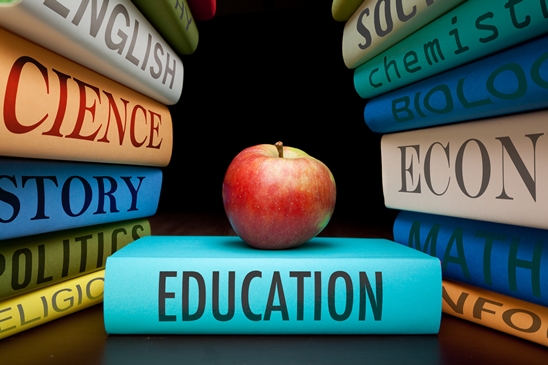You can be a princess or a knight saving the princess. Or become a detective on the hunt for the next set of clues. You can be an animal and have conversations with other animals. Learn all about the different dinosaurs or all about the world’s active volcanoes. All of these insights of information is exciting when pulled from books. And there’s a lot more where these came from. Millions more! All you need to do is add a library day in your weekly homeschool schedule!
Books are the hallmark of homeschool families, just in case you didn’t know. [Ha!] Books help add to imagination, vocabulary, and creativity not only to our offspring but also to us homeschool moms and dads. And that’s barely skimming the top of the benefits that books offer a family.

Build Lesson Plans With Books
Better yet, you can build an entire year’s worth of lesson plans just from a book alone! Many families, mine included, use book spines on several occasions to create lessons of topics.
For example, sometimes the curriculum we get for our kids skip a topic that we would like to learn or the curriculum doesn’t touch on a topic long enough. In this way, we take a dive into certain topics – or even a deep dive into whole subjects – that we know will teach our young ones something new and interesting. Something we believe that could empower our children if armed with particular information.

Family Read Alouds
I believe it’s important for children to be exposed to all sorts of reading creativity. One of these ways to use books is for family read aloud sessions. I love reading books to my children. They create some of the best memories for them and for me.
These books can be any type of book. If you’re exploring The Middle Ages, for example, use Robin Hood as a read aloud to create more of an impact. If your kids are learning about the different elements of poetry, you can add in a series to read every type of these poems on a day to day basis.
You can even engage your children by reading stories at night time before bedtime. It is one way to keep their undivided attention, once they’re relaxing in the bed after a long day. It also relaxes their mind, making them much more susceptible to falling asleep. This is especially useful if you have a child that oftentimes has trouble going to sleep.

Using Books For Every Subject
Doing a quick google search of a subject + reading book will no doubt show you page after page of books for all subjects. If you’ve ever been to the library, going into their educational section will show you books from a huge range, from geometry to a dwarf planet in the solar system, and everything in between.
Books are a fantastic way to learn about a subject on another level. Listening or reading a book about a subject evens out the understanding of a topic in an easier and understandable way. Many students also learn best when reading about something, being able to retain that information stronger than other forms of learning styles.
Great examples are given in books to help children see how a topic works in real-time. They just sat through their lesson with you teaching a topic and maybe had them do some hands-on activities or worksheets on it. But there is nothing quite like having a book to represent a subject to strengthen the overall comprehension.
Assigning Book Topics For Your Homeschool
Of course, there are many more ways to use books in your homeschool not listed here. Like book reviews, reading comprehension, teaching symbolism, metaphors, real-life events. The list goes on!
Because of the many uses of books, you will likely need to journey to the library often. Especially if you have more than one child learning more than one subject! You need books for many reasons, just like how the books are used for many of the opportunities listed above.
As you plan your lessons, whether it be a week at a time or a month at a time, you will know which topics and subjects your children will be studying for the week. With this knowledge, you are now armed with a checklist of types of books to look into.
There really is no hard and fast rule for your children reading certain books for each grade level. However, many of the booklists you will find on google will help you narrow down your choices.
Recommendations are also given for reading books. For instance, it is okay to read books aloud to your children that are rich in words and vocabulary and intriguing plots. It helps children become familiar with those words and expands their minds.
Also, it’s ideal for children to read books that are at or slightly above their reading level. To find your child’s reading level, your child will read lists of words, one list after another, and that’s when their level is determined. You can find great online reading tests for your children, too.
I also really enjoy SchoolhouseTeachers.com’s Literacy Center. Not only does it give you ideas for different reading levels, but it also matches you up with readers and activities that are spot on with your child’s reading level! You can also get help with reading through their Focused Learning Centers.

Adding a Library Day Into Your Homeschool Schedule
You can discover various ways to add a library day into your homeschool schedule. For instance, I like to theme my days of the week and then build a schedule according to those themes. So Mondays and Fridays are always our lightest homeschool days. And Tuesdays, Wednesdays, and Thursdays are our longer, in-depth days.
And because I know which topics my children will be studying for the week, I know to search for certain books mirroring those topics. I also find like-minded homeschool families through Facebook groups that offer up fabulous ideas for different books by subject.
At this point, you see how much I search google now to gain information or to get ideas. Therefore, you can do a google search yourself to see which books are best when studying [topic]. Recently, I just did a search for the best books to read during the Middle Ages and came up with so many wonderful books to choose from for both my read alouds as well as picture books and chapter books for my independent readers.
With your library list at the ready, you are prepared to journey to the library! But when? And can’t you do it online?
Yes, you search your library’s online catalog. You can also reserve these books and just swing by the library to pick them up any day of the week. Just be sure to know ahead of time when your library opens and closes as well as which days.
Especially nowadays, many libraries are still closed due to COVID-19. But if your library is one of the libraries that just opened its doors, curbside pickup may no longer be the only option for getting your library books. So you can still reserve your books online or go to the library and peruse!
Frankly, all of my children as well as myself absolutely love going to the library. This is why I make sure to schedule a Weekly Library Day into our weekly homeschool schedule.
Our homeschool schedule looks something like this:
Monday: light homeschool days + Library in the afternoon
Tuesday: full homeschool day
Wednesday: full homeschool day
Thursday: full homeschool day
Friday: light homeschool days + Field Trip Day/Virtual Field Trip/Project Day in the afternoon
To see a closer look at what this sort of weekly schedule looks like, including times for each subject as well as times for the Library Day, you can see the daily schedule templates here.
How To Add A Library Day In Your Weekly Homeschool Schedule
Books empower every subject and embolden every child. Through the worlds of books, your child can be anything and go anywhere! Stretch imagination and build vocabulary while you read! Add in your own library day into your weekly homeschool schedule and watch your children soar!
—oOo—
A huge Thank You to Richie Soares at Homeschool & Humor for writing this article.
Connect with Richie on Social Media: Facebook — Twitter — Instagram

